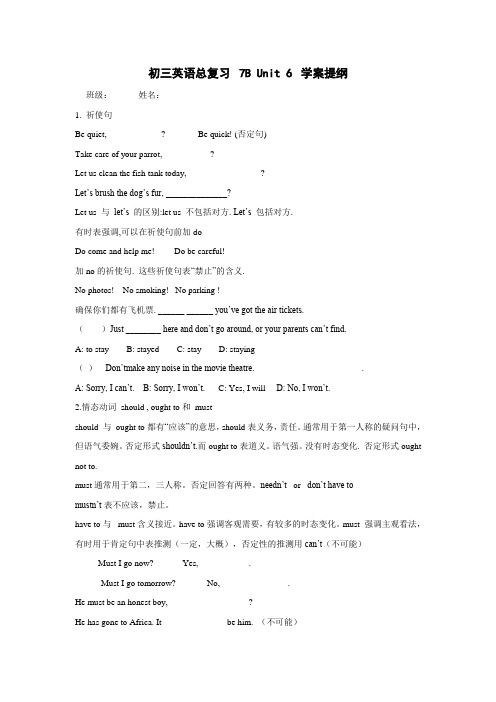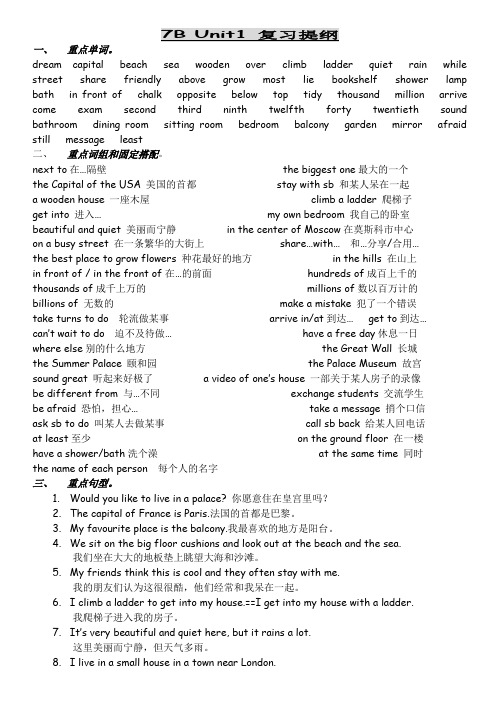人教版7B 期末复习提纲(修改版)
- 格式:doc
- 大小:48.00 KB
- 文档页数:4

初三英语总复习 7B Unit 6学案提纲班级:_____ 姓名:_____1. 祈使句Be quiet, ____________? Be quick! (否定句) _____________Take care of your parrot,___________?Let us clean the fish tank today,_________________?Let’s brush the dog’s fur, ______________?Let us 与let’s 的区别:let us 不包括对方. Let’s 包括对方.有时表强调,可以在祈使句前加doDo come and help me! Do be careful!加no的祈使句. 这些祈使句表“禁止”的含义.No photos! No smoking! No parking !确保你们都有飞机票. ______ ______ you’ve got the air tickets.()Just ________ here and don’t go around, or your parents can’t find.A: to stay B: stayed C: stay D: staying()---Don’tmake any noise in the movie theatre. ---______________________.A: Sorry, I can’t.B: Sorry, I won’t.C: Yes, I will D: No, I won’t.2.情态动词should , ought to和mustshould 与ought to都有“应该”的意思,should表义务,责任。
通常用于第一人称的疑问句中,但语气委婉。
否定形式shouldn’t.而ought to表道义。
语气强。
没有时态变化. 否定形式ought not to.must通常用于第二,三人称。

Unit 2 Travelling around the world March 7, 2017 ★Phrases and sentences1. go on holiday 去度假2. go sightseeing 去观光3. go shopping 去购物4. in the future 将来5. why not do sth. 为什么不做某事6. take the lift 乘电梯7. walk up 向上走8. go down the stairs 走下楼梯9. plan to do sth. 计划做某事10. write to 给……写信11. continue to do sth. 继续做某事12. be famous for 以------而闻名13. be famous as 作为------而闻名14. prefer to do sth. 更喜欢做某事15. department store 百货商店16. the capital of ------的首都17. Western Europe 西欧18. on the coast 在海滨19. place of interest 名胜20. such as 例如21.by the sea 在海边22. try doing sth. 尝试着做某事23. be different from 与------不同24. on a website 在网站上★Meaning of the words and phrases1.excellent --- very good2.prefer---like better3.finish---complete/ end/ be over4.possible---probable5.prefer to do sth.---enjoy doing sth.6.go on holiday --- take a vacation7.be famous for--- be well-known for8.in the centre of --- in the middle of★Language:一、专有名词的用法专有名词是指人、地方、称谓、机构、语言、星期、月份、节日等的专有名称。

Chapter 3 Our animal friends ★Phrases and sentences1.到达2.导盲犬3.欢迎您做某事4.很抱歉……5.允许做某事6.允许某人做某事7.独自一人8.向某人道歉9.带领某人到……10.入睡11.醒来12.在某人的帮助下13.在…的底部14.从门的下面15.蹲下,趴下16.挨着某人17.消防车18.将……带出大楼19.在……前面20.在两本书之间21.在第二天的早上22. (天)变黑1. arrive at2. a guide dog3.You are welcome to do sth.4. I’m sorry that…5. allow doing sth6. allow sb to do sth7. by oneself8. apologize to sb9. lead sb to10. fall asleep11. wake up12. with one’s help13. at the bottom of14. from under the door15. get down16. next to sb17. fire engine18. get …out of the building19. in front of20. between two books21. on the morning of the second day22. get dark★Meaning of the words and phrases1.blind--- cannot see anything2.helpful--- useful, is happy to help3.rescue---save4.wake---stop sleeping5.fall asleep---be asleep6.finally---at last7.appear---be seen8.nothing---not anything9.by oneself--- alone10.apologize---say sorry, make an apology11.allow pets---let pets enter12.arrive at---reach, get toLanguage:*反身代词观察下面关于人称代词主格、宾格以及反身代词的表格,请同学们总结出反身代词构成的规则。

一、+ do(动词原形)1.make sb do sth使某人做某事►make sb not do sth2.let sb do sth 让某人做某事3.Would/Will you please do sth?►Would/Will you please not do sth?4.you'd better do sth/you'd better not do sth5.Why not do sth? =Why don't you do sth?6.Shall we do sth?=Let's do sth, shall we?7.★help sb (to) do sth=help sb with sth帮助某人做某事※be (very)helpful to sb=be of (great) help to sb注意:1)see sb do sth(习惯性的动作)►see sb doing sth(正发生的动作)2)watch sb do sth►watch sb doing sth3)notice sb do sth►notice sb doing sth4)hear sb do sth►hear sb doing sth巩固练习①I saw/noticed two dogs (fight) with each other at three yesterday afternoon.②Can you hear the children (sing) in the next room?③I often heard someone (sing)next door before.④Would you please (not play)computer games too much? It is bad for your eyes.⑤It's going to rain, so you'd better (not stay) outside too late.⑥Why not (watch)a film with your friends tonight?⑦Lucy's hair is about five inches long. It makes her (look) lovely.二、+ doing(动名词)1.can't stop doings sth 不能停止做某事2.sb can't help doing sth忍不住做某事=sb can't helpbut do sth※can’t help do sth不能帮助做某事3.have fun (in) doing sth=have a good time (in) doing =enjoy oneself (in) doing sth开心做某事4.be busy (in) doing sth※be busy with sth忙于做某事5.look forward to doing sth期待做某事6.pay attention to doing sth/sth注意做某事7.be interested in (doing) sth对做某事感兴趣※=show/have interest in (doing) sth8.sb spends/spent some time/money (in) doing sth※=sb spends/spent some time/money on sth9.thank sb for doing sth感谢某人做某事10.What/How about doing sth?11.have trouble/ difficulty/problems (in) doing sth=have trouble/ difficulty/problems with sth 做某事有困难※have no/little difficulty (in) doing sth12.worry about doing sth►worry about not doing sth13.be worried about doing sth►be worried about not doing sth14.do well in sth/doing sth=be good at sth/doing sth擅长做某事15.be afraid of doing sth=be afraid to do sth害怕做某事16.the way of doing sth=the way to do sth做某事的方法17.★there be +主语(人)+doing sth有某人正在做某事►There are a lot of people waiting for the bus.※there be +主语(物)+to do有物要...►There are lots of interesting things to buy in the shopping mall.18.recommend doing sth推荐做某事►recommend not doing sth19.keep (on) doing sth一直(坚持)做某事20.keep sb doing sth使某人一直做某事21.keep sb from doing sth阻止某人做某事※=stop sb from doing sth=prevent sb from doing sth22.practise doing sth练习做某事23.enjoy doing sth喜欢做某事24.dislike doing sth不喜欢做某事25.miss doing sth错过/思念做某事26.mind doing sth介意做某事►mind sb/sb's doing sth27.Doing morning exercises is good for our health.做早操对我们健康有好处。

7B Unit 1-2复习1.next to (prep、) 紧邻,在近旁= by = beside ;next (adj、) 下一个nextweek/month2.There are twenty restaurants in town、镇上有二十家餐馆。
①表示某地有……,用there be 句型,谓语动词就近原则。
②表示有事情要做,用there be sth to do、There are lots of things ___________(see) in places of interest、③表示有某人做某事,用there be sb doing sth、On game shows, there are always famous people_____________(talk) about their lives、3.The biggest one in Fifth street! 在第五大街最大得那一家。
√big-bigger-biggest4.I live in a town 15 miles from London、我住在离伦敦15英里得一个镇上。
be far (away) from 离……远,但出现具体距离时,不用far5.enjoy a cup of tea 享受一杯茶enjoy doing sth①We have great fun ______________(play) with each other in the playground、②What great fun we have ___________(play) with each other in the playground、③It’s great fun ______________(play) with each other in the playground、6.We often listen to music in bed、我们经常躺在床上听音乐。

一、重点单词。
dream capital beach sea wooden over climb ladder quiet rain while street share friendly above grow most lie bookshelf shower lamp bath in front of chalk opposite below top tidy thousand million arrive come exam second third ninth twelfth forty twentieth sound bathroom dining room sitting room bedroom balcony garden mirror afraid still message least二、重点词组和固定搭配。
next to在…隔壁the biggest one最大的一个the Capital of the USA 美国的首都stay with sb 和某人呆在一起a wooden house 一座木屋climb a ladder 爬梯子get into 进入…my own bedroom 我自己的卧室beautiful and quiet 美丽而宁静in the center of Moscow在莫斯科市中心on a busy street 在一条繁华的大街上share…with…和…分享/合用…the best place to grow flowers 种花最好的地方in the hills 在山上in front of / in the front of在…的前面hundreds of成百上千的thousands of成千上万的millions of数以百万计的billions of 无数的make a mistake 犯了一个错误take turns to do 轮流做某事arrive in/at到达…get to到达…can’t wait to do 迫不及待做…have a free day休息一日where else别的什么地方the Great Wall 长城the Summer Palace 颐和园the Palace Museum 故宫sound great 听起来好极了 a video of one’s house 一部关于某人房子的录像be different from 与…不同exchange students 交流学生be afraid 恐怕,担心…take a message 捎个口信ask sb to do 叫某人去做某事call sb back 给某人回电话at least至少on the ground floor 在一楼have a shower/bath洗个澡at the same time 同时the name of each person 每个人的名字三、重点句型。
Chapter 7 Poems ★Phrases and sentences1.讲故事2.不仅仅3.淋浴4.完整的句子5.太……而不能6.有什么新鲜的事7.看见某人正在做某事8.在建筑工地上9.高高在上,在高处10.为……而担忧11.在报摊12.公共汽车站13.冲出去14.阳光明媚15.根本不,一点也不16.放下17.一群人18.有很多时间做某事19.一直20.改变某人的想法21.多么美妙!22. 多好的一天!1. tell stories/ tell a story2. not only3.have a shower4. complete sentences5. too… to …6. what’s new7. see sb doing8. on the building site9. high up10. be worried about11. at the newspaper stand12. bus stop13. rush out14. The sun is shining.15. not at all16. put down17. a crowd of people18. have much time to do sth19. all the time20. change one’s idea21. How wonderful!22. What a lovely day!★Meaning of the words and phrases1.advice--- suggestion2.narrow--- not wide3.rush out---run out, go out quickly4.agree---say yes5.disagree---say no, not agree6.ordinary---usual, common7.no---not a/ any8.aloud---loudly9. a crowd of--- a lot of, lots ofplete---all the…, the whole…11.be worried about---worry about, be unhappy aboutLanguage:*祈使句1. 祈使句的结构:当我们向他人发出命令,提出要求或建议时,常使用祈使句。
7B Unit 1 Dream homes复习提纲本单元复习任务:1.熟背单词;2. 背诵Reading 课文;3. 复习提纲内容;4. 整理装订并复习学案。
一.词汇1.dream(n./ v.) dream about/of sth./doing sth.2.palace注意拼写区别:place plan plane3.beach(es)4.wood (n.) wooden (木质的);gold (n.) golden (adj.) (金色的);wool (n.) wool(l)en (adj.)(羊毛的)5.over 在…上方(垂直上方) 反义词: under超过(=more than) 反义词: less than above 在…上方; 反义词: belowon 在…上(表面)6.chalk 粉笔(不可数) a piece of chalk7.tidy (tidier, tidiest)整洁(区别:clean干净)8.shelf-shelves ( leaf, wife, knife, thief)9.arrive (at+具体地点, in城市/国家)get to…reach 直接加地点10.worry (v) sb~ about sth; sth ~sbworried (adj.) be ~ about sth.11.others = other+名词复数其他的(泛指); the others= the other+名词复数剩下所有的(特指); one and the other (n.)两者中的一个和另一个;another另一个二.短语1.chat with 和…聊天2.look out at the beach向外看着沙滩;look out of the window 从窗户向外看3. a bridge over a river 小河上的一座桥4. a wooden house = a house made of wood一栋木制的房子5.climb a ladder to get into…爬梯子进…6.make/cook dinner 做晚饭7.in the evening s 每天晚上8.on a busy/quiet street 在一条繁忙的街道上9.share sth. with sb.和某人分享某物10.in the centre of..在…中心;in the middle of.. 在…中间;in front of ../behind..在…的前/后面in the front of../at the back of..在…的前/后部分on the right/left 在左/右边to the right/left of…在…的左/右边11.be different from 和…不同be the same as 和…一样12.at least 至少(≥) at most 最多(≤)三.句型1.Would you like / Do you want / Do you feel like + sth? 你喜欢/ 想做某事吗?Would you like/ Do you want + to do sth? Do you feel like doing sth.?2.Which is your favourite? = Which do you like best/most? 你最喜欢哪一个?3.The capital of… is….某国的首都是…对地点提问用:what’s the capital of…?4.It rains a lot. = There is a lot of rain. = There is a heavy rain.这里经常下雨。
Chapter 4 Save the trees★Phrases and sentences1.日常生活 1. daily lives2.想要做某事 2. want to do3.想了解……更多 3. know more about sth.4.采访某人某事 4.interview sb. about sth.5.让空气凉爽而干净 5. keep air cool and clean6.有害的气体 6. harmful gases7.主要的斗士7. major fighters8.使……更方便8. make … more convenient9.来自9. come from10.例如10. for example11.事实上11. in fact12.从……得到12. get…from13.树的叶子13. the leaves of trees14.向四周看14. look around15.接电话15. answer the phone16.没有树的世界16. a world without trees17.砍倒17. cut down18.成百万上千万18. millions of19.每年19. every year20.停止做某事20. stop doing sth..21.写下,记下21. write down22.躺在沙滩上22.lie on the beach23. 考虑23.think about24.尽力做某事24.do one’s best to do sth.25.空气污染25.air pollution26.在许多方面26.in many ways27.因为27.because of28.对……有益,有好处28.(be) good for★Meaning of the words and phrases1.save ----- keep sb./sth. safe from death/harm; rescue; protect2.discuss-----talk about sth. with sb.3.harmful----- not healthy; bad for4.produce-----make things to be sold5.convenient-----useful or easy to doe from-----be from7.look around-----look about/round8.major-----main;big and important9.for example-----such as10.f ight against----- try hard to stop11.c arry----- take sth. with sb.12.i magine----- make a picture of sth. in mind13.t ake in-----breathe; absorb14.Language:*现在进行时态1. 定义: 表示现在(说话瞬间)正在进行的动作。
7B Unit 4 Amazing things复习提纲本单元复习任务:I.词汇1. bright 明亮的,聪明的2. travel travelled travelling3. on Earth/ on the earth 在地球上4. an elephant 一头大象5. without (prep) 无、没有without doing sth6. light n ing 闪电light 灯、光7. usual (adj)平常的usually (adv)通常unusual an unusual story 一个不寻常的故事8. hear 听到(结果) listen to …听(动作)9. bush 灌木丛bush es10. feel frightened 感到害怕的11. (肯) somebody, something(否、一般疑) anybody, anything(否)nobody, nothing12. care (n) take care of = look after 照顾careful (adj) be careful with 小心对待carefully (adv) do homework carefully13. noise 噪音voice 嗓音sound 声音(总称) strange noise奇怪的声音make noise发出噪音have a good voice 有一个好嗓子14. happen 发生take place (无被动)15. search the Internet 搜索因特网16. weak 虚弱的– strong 强壮的17. soft 柔软的- hard 坚硬的18. last 上一个last Sunday 上星期天last 最后的the last to arrive at the cinemalast 持续How long will the bad weather last? 坏天气会持续多长时间?19. be crazy about 对…痴迷20. be fond of 喜欢21. like 喜欢dislike 不喜欢like 像unlike 不像22. few (否) a few (肯定) + 可复little (否) a little (肯定) + 不可数23. practice doing sth 练习做某事24. even 甚至(通常加比较级)25. wake up 醒来wake sb up 把某人叫醒26. early 早earlier the earliest27. bark at sb (狗)对…吠28. hard-working (adj) 勤奋的hard work 艰苦的工作work hard 努力工作29. What a pity!真遗憾30. die 死dying dead (adj) have been deaddeath (n) the death of31. a long time ago很久以前32. appear 出现disappear 消失33. science 科学scientist 科学家34. weigh (vi) 重weight (n) 重35. 规则的说谎(lie lie lie)不规则的躺(lie lay lain)躺过就下蛋(lay laid laid),下蛋不规则36. baby – babies37. an ant 一只蚂蚁38. remember to do 记得去做某事remember doing 记得做过某事39. goldfish- goldfish40. second 秒,第二41. decide to do sth 决定做某事decision (n) 决定make a decision to do42. sandwich(es) 三明治43. name… after …以…命名44. invent发明invention发明物inventor 发明家45. TV set 电视机46. in history 在历史上47. 其他四会单词: yesterday, moon, plant, everything, himself, later, kick, stone, can 罐子, guide, introduction, frog, poisonous, kilogram,Love rules his kingdom without a sword. 复习时间:______________________________grass, camel, giraffe, tortoise, bone,, neck, word, during, piece, star, once, dish(es) II.词组1. travel from the earth to the moon byspaceship 乘飞船从地球到月球旅行2. at the same time 同时3. as usual 像往常一样4. on on e’s way (to …) 在某人去…的路上5. run away 逃跑6. say to oneself 自言自语7. make a sound like a whisper 发出一个像低语的声音8. the animal center 动物(保护)中心9. have a great time 玩的开心10. not … any more 不再not… at all 一点也不11. sound like 听起来像…12. take photos 拍照13. so many amazing things 如此多…14. hundreds of …数百个…15. live up to 150 years old 活到长达150岁16. know more about 了解更多关于17. find it interesting发现它有趣(宾补)18. play cards 打牌19. keep (on) doing 持续做某事20. set up 建立,成立21. at least 至少22. some beautiful dresses made of silk 一些由丝绸做成的连衣裙(过分做后置定语) 23. be surprised to do 惊讶于做某事III.句型1. Fish sleep with their eyes open. 鱼睁着眼睛睡觉。
人教新版七年级历史下册期末复习提纲一、中国古代史(下)年代表①隋(隋文帝杨坚)②唐(唐高祖李渊)③五代④辽/契丹(契丹族耶律阿保机)⑤金(女真族完颜阿骨打)⑥元(由蒙古国改名而来)(蒙古族)⑦明(明太祖朱元璋)⑧清(由后金改名而来)(女真族/满族)④西夏(党项族元昊)③十国④北宋(宋太祖赵匡胤)⑤南宋(宋高宗赵构)(⑥蒙古国是由成吉思汗(铁木真)所建立;后元世祖忽必烈改“蒙古”为“元”)(⑧后金是由努尔哈赤所建(定都盛京,即现沈阳);后皇太极改“后金”为“清”,改“女真族”为“满族”,最后顺治迁都北京)二、隋唐时期时代特征:繁荣与开放(一)、政治和经济内容:1、隋朝(581年,定都长安):①、创立者隋文帝杨坚②、隋炀帝杨广,其统治时期修建大运河A、隋朝大运河:a、联三城:北到涿郡(北京)——中心洛阳——南到余杭(杭州);b、通四段:永济渠——通济渠——邗(hán)沟——江南河;c、连五河:海河——黄河——淮河——长江——钱塘江;d、意义:南北交通大动脉,加强南北方经济交流2、唐朝(618年,定都长安):(1)政治部分:①、创立者唐高祖李渊②、唐太宗李世民(贞观之治)(名臣:魏征、房谋杜断)共同点:③、周·武则天(政启开元,治宏贞观)整顿吏治、任用贤才④、唐玄宗李隆基(开元之治)(唐朝最繁荣时期)(名臣:姚崇、宋璟jǐng)⑤、发生在唐玄宗后期的安史之乱后标志着唐朝由盛转衰(关键词:藩镇割据,内轻外重(地方与中央权力失衡),安禄山,史思明)⑥、之后又历经农民起义——黄巢起义(关键词:藩镇割据,社会矛盾,黄巢、朱温)⑦、北方政权更迭(五代:后梁、后唐、后晋、后汉和后周)▲(中国古代史时代主流和趋势:国家统一,政治、经济实现统一)(2)经济部分:①、农业上,耕种工具曲辕犁和灌溉工具筒车的广泛使用提高了生产效率。
②、手工业上,越窑青瓷、邢窑白瓷和唐三彩较为出名;③、商业上,大都市有长安(国际化大都市、全国政治、经济、文化中心)。
(其中长安采取坊市制的规划(坊作居住之用,市作买卖之用,市的开闭有时间限制。
))(3)对内民族部分:①、与吐蕃(即西藏,西南地区,藏族)友好:唐太宗把文成公主嫁给松赞干布(大昭寺);唐中宗把金城公主嫁给尺带珠丹(唐蕃会盟碑/甥舅会盟碑/唐蕃和为一家);②、唐太宗被各民族誉称为“天可汗”;③、唐太宗时期在新疆设置安西都护府;⑦、武则天时期在新疆设置北庭都护府(4)对外文化经济交流部分:①、与日本友好:派鉴真东渡日本(唐招提寺);②、玄奘西渡天竺(《大塘西域记》);③、外国使者访华者一般叫遣唐使;④、各国人称中国华人为“唐人”(5)文化内容:①、唐诗的发展:A、唐朝繁荣期——李白(诗仙)(浪漫主义,飘逸洒脱,充满想象力和感染力)B、唐由盛转衰——杜甫(诗圣、诗史)(现实主义,前期豪放,后期悲愤凄婉)C、唐朝衰落期——白居易(现实主义,讽喻社会,同情百姓,通俗易懂)②、唐代书法绘画:A、书法:a、颜真卿(颜体,王羲之后最有成就大书法家,《多宝塔碑》《颜氏家庙碑》)b、欧阳询(方折峻丽,笔力险劲,《九成宫醴泉铭碑》)B、绘画:a、吴道子(画圣,写意画,落笔雄劲,风格奔放,《松子天王图》)b、阎立本(擅长人物画,形态各异,神形兼备,《历代帝王像》)③、社会风气:积极向上,兼容并蓄,开放进取▲④、科举制A、诞生:隋炀帝设置进士科B、发展:a、唐太宗发展科举制,进士科第一者为状元;b、武则天开办殿试;c、唐玄宗把诗赋纳入科举考试;d、北宋时期提高文人地位;e、明朝时期八股文的兴起,钳制士人思想(科举考试题目必须出自四书五经,针对题目的解释必须根据朱熹的《四书集注》进行解释)。
C、关键字:a、明经科(考查四书五经的诵读);b、进士科(考时务策)(即时政热点,对时政意见);c、八股文(科举考试文章的必要格式)D、实质和意义:巩固统治者统治,扩大选官基础,有利于培养人才,形成良好学风E、持续时间:至清末才被废除二、宋元时期时代特征:民族关系发展和社会变化(政权并立与更迭)(一)、宋元时期政治内容:1、辽(契丹)(916年/10世纪初,(契丹族)辽太祖耶律阿保机,定都上京)2、北宋(960年/10世纪中,宋太祖赵匡胤,定都开封(汴京))①、中央设置多个与丞相同等地位的机构。
②、地方设置行中书省(行省制),地方最高长官为知州,知州一般由文官担任,并且设置通判监督知州。
后来地方设置转运使,将地方财赋收归中央。
北宋时期重文轻武政策——当时军不识将,将不识军时有发生。
(评价重文轻武政策:积极:①、杜绝武将兵权移政和专权独断;②、促进了民间读书风气,提高社会文化素养。
消极:①、将军意志受到打击。
②、士大夫为主的官僚机构臃肿,办事效率低。
)3、西夏(11世纪初,(党项族)首领元昊,定都兴庆)北宋和辽签订澶渊之盟(宋真宗、寇准);北宋和西夏签订和议;4、金(12世纪初,(女真族)金太祖完颜阿骨打),定都会宁)①金灭辽②金灭北宋——靖康之耻(宋钦宗、宋徽宗)5、南宋(1127年/12世纪初,宋高宗赵构,定都临安(即杭州))岳飞郾城大战抗金胜利→宋高宗和秦桧谋害岳飞;南宋和金签订宋金和议(以淮水--大散关为两国国界)6、蒙古国:1271年/13世纪后期,(蒙古族)铁木真(成吉思汗)建①蒙古军先灭西夏和金②元朝时期蒙古军灭南宋(文天祥抗元)7、元朝(1206年/13世纪初,(蒙古族)元世祖忽必烈,定都大都(即北京)①、中央只设置中书省(中书省直管腹里地区:山东、山西和河北)②、地方设置行中书省(又称“行省”,中国省级行政规划可追溯到元朝)③、设宣政院管西藏(西藏开始归中央管辖),设澎湖巡检司管澎湖列岛和琉球(现台湾)。
(二)、宋元经济和社会生活①、两宋时期农业快速发展(“苏湖熟,天下足”,苏州和湖州成为粮仓),引进高产量的占城(即越南)稻,广种茶树(江南地区)和棉花(两广、福建地区)等。
②、两宋时期主要的商业都会有开封(即东京/汴京)和临安(即杭州)(当时开封最繁华的是相国寺),地方出现众多的早市、夜市和草市(农村地方)(打破坊市制);而元朝主要的商业都会有大都(即北京)。
(北宋四川地区出现最早的纸币交子)③、宋元时对外贸易发达,宋朝外贸大都有广州、泉州等,中国商船最远到达非洲东海岸,在外贸地方设置市舶司(设置蕃坊供外商居住),元朝时期外贸发展更快,海上丝绸之路达到鼎盛。
(马可·波罗与《马可·波罗游记》)④、两宋时期手工业快速发展,其中纺织业上蜀锦号位冠天下,浙江和海南等地纺织业也发展快;制瓷业上以北宋瓷都景德镇较为出名;造船业以广州、泉州和明州最为发达。
⑤、两宋时期民众在娱乐上可以到商娱地方瓦舍(勾栏专供演出)(产生原因:市民阶级壮大),民间多数出演杂剧(杂剧形成于宋朝,兴盛于元朝);有元旦(即春节)(贴桃符、守岁等习俗)、元宵、端午、中秋等节日。
(三)、经济重心南移:①、开始时间:唐朝中后期;②、原因:A、南方气候更适合农业发展;B、南方政局稳定;C、南迁人口带来大量劳动力和生产工具及先进生产技术;③、意义:促进南方经济发展,南宋时期经济重心南移完成。
(四)、宋元文化:1、四大发明:造纸;火药;指南;活字印刷(东汉蔡伦)(唐始;宋元用)(战国司南/北宋指南)(北宋毕昇)2、书法绘画:①、绘画:[北宋]张择端《清明上河图》;3、文学成就(宋词、元曲、史学):3-1 宋词:①、北宋——豪放派——苏轼(特点:豪放飘逸);②、两宋期间——婉约派——李清照(特点:前期清新婉约,后期凄婉悲伤)③、南宋——豪放派——辛弃疾(特点:豪放,壮志未酬)3-2 元曲①、元曲四大家:关(关汉卿;代表作《窦娥冤》)、白(白朴)、马(马致远)、郑(郑光祖)②、关汉卿元曲特点:关注下层百姓生活,通俗易懂。
③、产生原因:汉族文人阶层受到元朝统治者压制,郁郁不得志之作。
*3-3 史学北宋·司马光《资治通鉴》(内容:战国--五代十国时期)(体例:编年体)西汉·司马迁《史记》(内容:黄帝--西汉汉武帝时期)(体例:纪传体)(两部史学共同描述了战国到西汉时期的史料)四、明清时期时代特征:封建君主专制达到顶峰(统一多民族国家的巩固和发展)(一)、政治内容:1、明朝:①、明太祖:朱元璋;定都南京;1368年(A、废除丞相,设三司,皇帝直接管理六部;B、设置特务机构锦衣卫;C、八股取士);②、明成祖:朱棣;迁都北京;1421年(A、设置内阁制度;B、实行削藩;C、设置特务机构东厂)2、明末李自成率领农民起义,人称闯王,后占据北京。
后山海关明将领吴三桂降清,引清兵入关,联手镇压李自成农民起义。
2、清朝的统治(女真族/满族)▲①、清初议政王大臣会议(皇权稍弱,乾隆时期废除)→康熙帝时设南书房→雍正帝时设立军机处(皇权至上,跪奏笔录,封建君主集权进一步强化/达到顶峰)②、文字狱和八股取士(康熙、雍正和乾隆三期)(尊孔读经)③、官僚体制腐败,结党营私,机构臃肿,后来该风气蔓延到军队里面。
地方百姓受权贵的土地兼并影响,沦为佃户和雇佣工人,生活悲惨。
(二)、经济内容:1、清朝经济政策:①、闭关锁国(广州十三行)(禁海政策);②、重农抑商政策*2、资本主义萌芽:①、出现时间:明末清初;②、表现方式(生产方式):雇佣关系(机户出资,机工出力);③、主要部门:纺织业(江浙地区);④、原因:商品经济的发展3、商业发达(商业大都市:北京和南京;地域性商人群体(商帮)形成)4、农业引进外国经济作物(例如:玉米、土豆、甘薯、向日葵等)5、丝织业和手工业发达(纺织业:明朝纺织中心苏州、南京和瓷都景德镇)(三)、民族和对外交往(社会内容):①、【对外】明朝郑和七次下西洋(最西到达非洲东海岸;目的:宣扬国威,友好沟通)②、【东南】明朝戚继光抗倭(东南沿海)③、【东南台湾】明朝郑成功抗荷夷(台湾)(1684年/清朝;设置台湾府,隶属福建省;1885设台湾省)④、【西南西藏】清朝管治西藏政策(顺治——达赖喇嘛;康熙——班禅;雍正——驻藏大臣(都是由中央任命))⑤、【西北】清朝康熙时期平定西北准噶尔部首领噶尔丹叛乱。
⑥、【东北】清康熙时抗击沙俄雅萨克之战(签订《尼布楚条约》,划定东北国界)⑦、【西北新疆】清乾隆时平定西北大小和卓叛乱(设置伊犁将军管理新疆地区)(四)、文化内容:1、小说盛行(四大名著):[明]罗贯中《三国演义》;[明]施耐庵《水浒传》;[明]吴承恩《西游记》;[清]曹雪芹《红楼梦》2、戏剧发达:①、[明]汤显祖《牡丹亭》(批评封建礼教);②、清朝昆曲(糅合南北曲调和诗赋内容)(洪昇《长生殿》和孔尚任《桃花扇》)③、清朝京剧(高亢爽朗,通俗易懂)(徽班进京和“皮黄戏”)3、科学农学:[明]徐光启《农政全书》(介绍农业生产经验);[明]宋应星《天工开物》(手工业著作;17世纪中国百科全书;思想:人与自然和谐相处)4、建筑艺术:①、紫禁城(故宫);②、明长城(东起鸭绿江~西到嘉峪关)5、药学:[明]李时珍《本草纲目》。